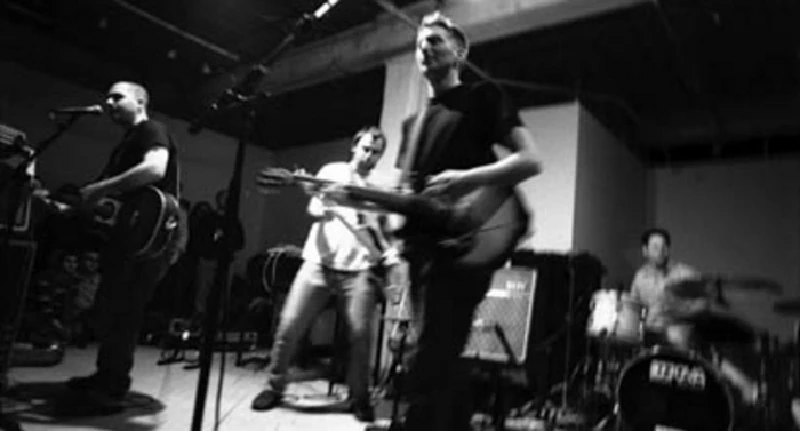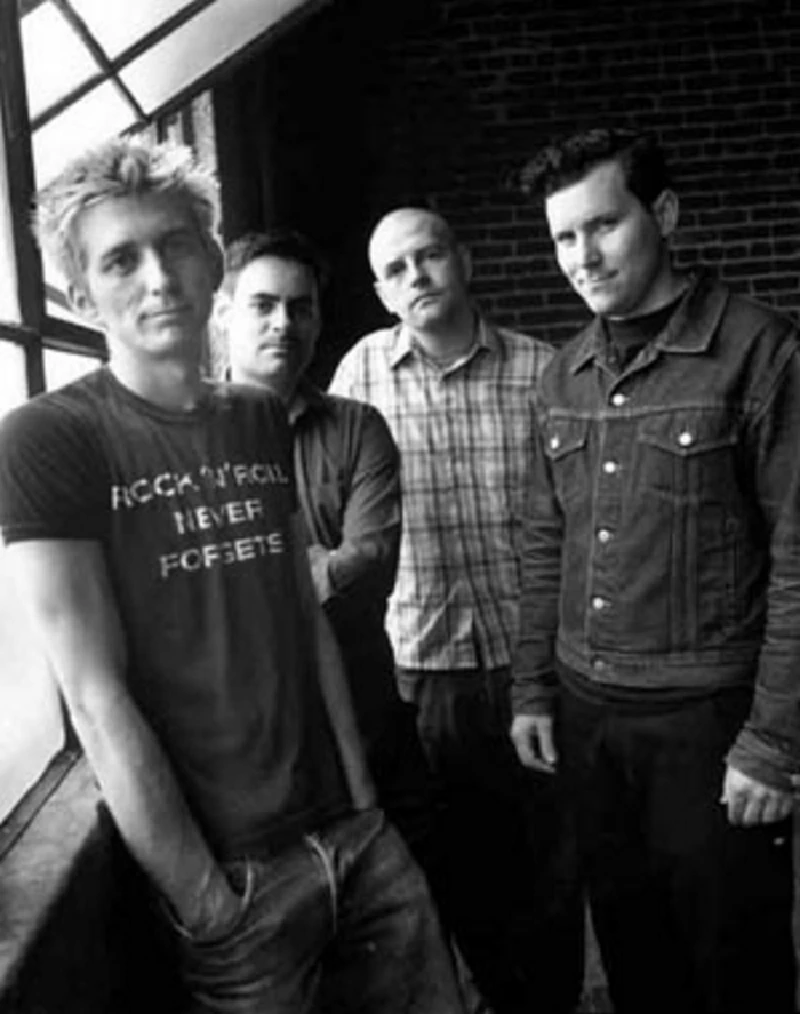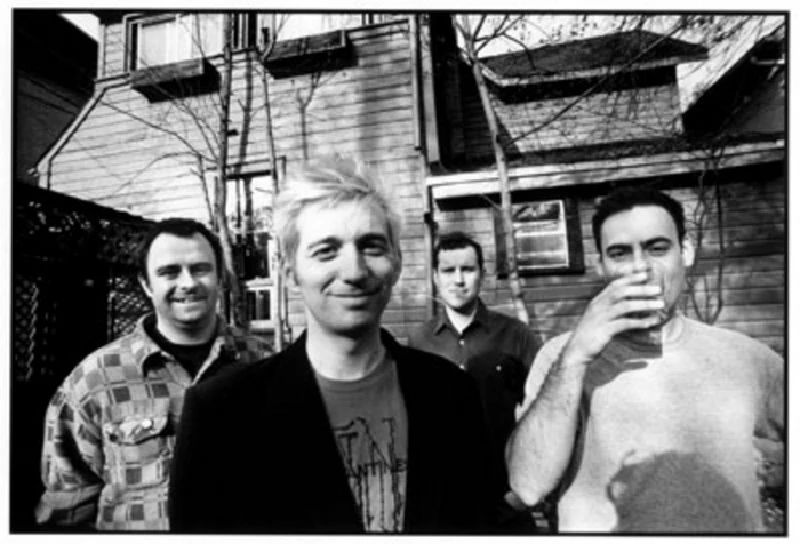Weakerthans - Interview
by Benjamin Howarth
published: 23 / 11 / 2007

intro
Under-rated by the media, the Weakerthans was formed a decade ago by former Propaghandi bassist John K Samson, and combine a punk-folk sound with introspective and literate lyrics. Ben Howarth speaks to frontman Samson about his group and their just released fourth album, 'Reunion Tour'
Formed a decade ago as a side project for the former bassist of Propaghandi (who had left that band to start a small publishing company), the Weakerthans have become a band with a keen following - despite the fact that they remain largely unacknowledged by the media. The cultish following was established by their second album, the exceptional ‘Left and Leaving’. Although there is a little hint of the band’s North American punk background, this album is essentially a folk album, built around John K Samson’s expressive, humane and poignant lyrics. After a break that was, in my opinion, far too long, they returned this year with their fourth album, ‘Reunion Tour’. I met the songwriter before his band’s show at the London Astoria 2, which seems to have changed its name again, having been the Mean Fiddler for a few years! In a few hours, Samson was to play a quite exceptional gig. Although I have loved 'Left and Leaving' for several years, I was taken aback by just how fervent the fans’ responses were. They knew the lyrics to every songs, and most gratifyingly, seemed to have fallen in love with the new album as well. On stage, the band were humble and polite, despite being in the process of tearing the place up. Beforehand, their singer was equally charming when I interrupted his evening for an interview. Later he was able to wander through a bar packed with his band’s biggest fans unnoticed. Refusing a drink, and chewing on nicotine gum, he spoke quietly, but was immediately articulate. PB: I want to begin by asking about the new album. It’s been available for a little while now, and I wondered how you feel now that it’s released, and what feed back you have had. John K Samson : It’s interesting. It took four years to write it and two weeks to make it. We just ripped the band-aid off and I think it sounds very much of a time and place - specifically a place, the place where we recorded it, basically a factory on the outskirts of Winnipeg where we live. I’ve been interested in the reaction. I don’t usually read reviews but I did this time. I like the record. I think it is good. But it is interesting that there seem to have been localities of critical thought. The New York press really liked the record, the UK press seemed cold and the Canadian press were somewhere in the middle. Everyone is supposed to like the same music now, because of the internet, but I find it interesting that places still have tastes. I don’t know what causes it. It must be really complicated. PB : I think in the UK press there may be something of a prejudice. You’ve been tagged as an emo band, somewhat unfairly, and I think that tag makes people less inclined to give some North American bands a fair hearing. But I would say that this album would be more fairly described as art-rock. I’d compare it to Grandaddy and bands like that. JS : I’d agree with that. PB : Do you think that you’ve changed who you’ve been listening to? JS : Not radically. The other guys might say differently, and that might be a factor. But I’ve been listening to the same things that I’ve listened to for a while. Some new stuff, but not much! PB : It took four years to write. Would you say that once you got to the studio it was an easy album to make? JS : It was easier than we expected. When we went into the studio we were not sure that we had a whole record. But once we got into the studio and started to much around with the producer, it was apparent that we did have a record. The recording process was comparatively easy. PB: Are you the sort of person that wants a producer to come in and help you put songs together and give the album its shape ? JS : I do need that. I need another pair of ears. Otherwise it is chaos! We’ve had the same producer for the past three records. We always talk about trying another and just come back to him. I suppose that’s another example of us being stuck in a pleasant rut. PB : On 'Left and Leaving' it felt that all the music was driven primarily by your songs. This one isn’t entirely the other way around but it seems that a lot of the songs start with the band and the music underneath. JS : I’d agree with that too. I think that this is a more cohesive and organic record. The songs emerged slowly, in a way that was more collaborative. PB : Meanwhile, you’ve stuck to a lyrical style that I’m sure your fans like. JS : I’m writing the same things over and over! But seriously, I think that I have found the thematic subjects that I want to explore, and I still have things to say on the subjects I’ve written about before. Having said that, this time I wanted to write more fictions than I have before. I’ve written some first person fictions before, but on this album for the first time there is no first-person that I could say was me. Also I did more research for this album. I went to the library and read about things. So it has changed in that sense. PB : Would you say that you have worked the lyrics out beforehand, had got them down on paper and then tried to work out how they should be sung ? JS : It’s different every time actually. It’s really quite different each time, but it comes together. I wish there was a programme I could follow to finish a song, but alas not. PB : Are there any writers and lyricists that you particularly look to as inspiration. JS : Yeah, there are a lot. I live with a songwriter called Christine Fellows, my wife. She’s a great influence on me, obviously. I also love the lyrics of the Hold Steady and the Mountain Goats. I’m really a student of John Prine, the singer-songwriter of the 70's, who is someone that I have always looked to for direction. I think that he is serious and whimsical at the same time, which is what good writing should be. PB : Do you do any other forms of writing? JS : Not really. I write poetry and some prose, and get it published in some Canadian magazines. I’d like to do more eventually. I think I’ve always been a thwarted fiction writer. But this is the only way I’ve figured out to do it so far. I don’t have the focus to sustain anything longer than a three minute pop song, but that is okay for now. PB : You started this band having ceased to be the bass player in Propaghandi, and it was a part-time venture essentially. Does it still feel like that ? JS : No. It feels like what I do now. It’s been over ten years. We do all do different things with our lives, but this is the central focus of what we do. PB : Is touring something that you see as a drag, and part of the job. Or is it the best part ? JS : It is a little of both. I feel churlish saying that touring is really awful, but it can be really awful. But it can also be really great too. That hour and a half spent on stage makes it all worth while. But being away from family and friends is difficult sometimes, and it is not something that I want to do forever. But we do this in sensible, focused chunks of time, so we manage it. PB : Going back to the theme we discussed before about different reactions in different places, do you feel that the audience reacts differently in different places ? JS : No, actually. They seem to react mostly the same which is certainly a good thing. That makes me think that there is something that the fans have in common. I don’t know what that is, although I really like them. They seem like good people. PB : Changing the subject, there has always been a social focus and a commentary aspect to your songwriting. What are you hoping to achieve by doing that ? JS : I think that the role of an artist is to expand on the voices that people hear, and I think that sympathy is a really strong political tool. I think that when you feel sympathy for another person, you can’t oppress them. So that is my fundamental politics, and I think that fiction and songs can do something to connect people to each other. Also, music and melody are such mysterious and great things. That makes this really worth doing. PB : You mention melody, and though this album is less straightforward, it is less folky. It is also clearly more melodic and, at times, catchy. JS : I think so too, yeah. I’m not sure where that came from. Alhough I have quit smoking, and that has allowed me to expand my three-note singing range to a five note range, which has been nice. PB : After ten years, are there things that you want to achieve that you haven’t? JS : I think the impetus to make something new comes from some embarrassment about what we’ve already made. I tend not to listen to a new album after a couple of weeks, but for those two weeks it can be kind of mortifying to hear all the things that could have been better. That keeps me going. Also, exploring the world through music is really exciting. And that certainly keeps me going. PB : Are you looking to expand the kind of places that you tour ? JS : No. We’ve been going to the same places that we’ve been going for a long time. I’d find it hard to start over somewhere, at this point of my life. I don’t want to go back to playing tiny clubs when we could be playing to people that know us already. We just do Canada, the US and quite a bit of Europe. PB : Is that a sign that you are comfortable with how successful you’ve been and how many people listen to you? JS : Yes, I am happy with the way that things are. I’d be happy with this for ever, although of course it won’t be as nothing does last for ever. I’m comfortable, and I think that if we were any bigger I might be a little uncomfortable. On this tour, for the first time we have been playing the same set every time. I’m really enjoying it. It’s interesting to see us do the same thing in different places, and gauge the reaction, and how they change over time. PB : Between releasing 'Left and Leaving' and making your third album 'Reconstruction Site', you moved from Sub City records to a bigger label, Anti. What prompted that decision? JS : It made things a lot easier, with touring and distribution. I think that it was time to try something new, and I’m really glad that we did. It was one of the best decisions that we ever made. They are very supportive and kind people. PB : On the time that you have been on the label, it has noticeably expanded the kind of bands that it signs. Have you noticed that affect what you do? JS : Yes, it has. I’m not sure that it has gotten bigger financially, but it’s certainly been exciting to be part of it as it has expanded artistically. PB : Thank you very much.
Picture Gallery:-


most viewed articles
current edition
Peter Doherty - Blackheath Halls, Blackheath and Palace Halls, Watford, 18/3/2025 and 21/3/2025Armory Show - Interview with Richard Jobson
Liz Mitchell - Interview
Lauren Mayberry - Photoscapes
Deb Googe and Cara Tivey - Interview
Max Bianco and the BlueHearts - Troubadour, London, 29/3/2025
Maarten Schiethart - Vinyl Stories
Sukie Smith - Interview
Clive Langer - Interview
Kim Wilde - Photoscapes
previous editions
Heavenly - P.U.N.K. Girl EPBoomtown Rats - Ten Songs That Made Me Love....
Trudie Myerscough-Harris - Interview
Doris Brendel - Interview
Beautiful South - Ten Songs That Made Me Love...
Kay Russell - Interview with Kay Russell
Dwina Gibb - Interview
Pulp - Ten Songs That Made Me Love...
Sound - Interview with Bi Marshall Part 1
Jay Reatard - Interview
most viewed reviews
current edition
Davey Woodward - Mumbo in the JumboNigel Stonier - Wolf Notes
Wings - Venus and Mars
Only Child - Holy Ghosts
Kate Daisy Grant and Nick Pynn - Songs For The Trees
Neil Campbell - The Turnaround
Philip Jeays - Victoria
Darkness - Dreams On Toast
Suzanne Vega - Flying With Angels
Charles Ellsworth - Cosmic Cannon Fodder
Pennyblackmusic Regular Contributors
Adrian Janes
Amanda J. Window
Andrew Twambley
Anthony Dhanendran
Benjamin Howarth
Cila Warncke
Daniel Cressey
Darren Aston
Dastardly
Dave Goodwin
Denzil Watson
Dominic B. Simpson
Eoghan Lyng
Fiona Hutchings
Harry Sherriff
Helen Tipping
Jamie Rowland
John Clarkson
Julie Cruickshank
Kimberly Bright
Lisa Torem
Maarten Schiethart